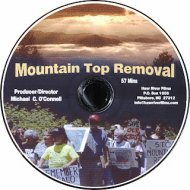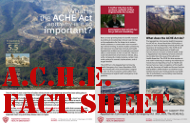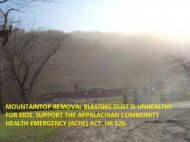
Appalachian Community Health Emergency (ACHE) Act Reintroduced
Feb 12, 2015

FOR IMMEDIATE RELEASE Feb. 12, 2015
Reps. Yarmuth, Slaughter Introduce Legislation to Study Health Consequences of Mountaintop Removal Coal Mining
Bill would halt new mountaintop removal permits while officials assess health dangers
Contacts:
Christopher Schuler (Yarmuth) 202-225-5401![]() 202-225-5401
202-225-5401![]() 202-225-5401
202-225-5401![]() 202-225-5401
202-225-5401
Eric Walker (Slaughter) 202-225-3615![]() 202-225-3615
202-225-3615![]() 202-225-3615
202-225-3615![]() 202-225-3615
202-225-3615
Bo Webb (ACHE Campaign) 304-237-0065![]() 304-237-0065
304-237-0065![]() 304-237-0065
304-237-0065![]() 304-237-0065
304-237-0065
WASHINGTON – Today, Congressman John Yarmuth (KY-3) and Congresswoman Louise Slaughter (NY-25) reintroduced the Appalachian Community Health Emergency Act, legislation that requires the first comprehensive federal study of the health dangers of mountaintop removal coal mining. The ACHE Act, H.R. 912, places a moratorium on all new mountaintop removal mining permits while federal officials examine health consequences to surrounding communities.
“We cannot sit idly by as this harmful mining method destroys our environment, contaminates our water, and jeopardizes the safety and well-being of the American people,” said Congressman Yarmuth. “As scientific evidence continues to mount showing the harmful health effects of mountaintop removal, this legislation will provide those impacted with the protections they are owed. The American people deserve to be safe in their communities, and the ACHE Act helps to do just that.”
“Scientific evidence demonstrates that mountaintop removal mining puts Americans’ health at risk and heightens the risk of birth defects in babies born near mining sites. People in mining communities have the right to live and raise their families in a safe, healthy environment, and reckless, profit-driven mining practices that contaminate the air and the water are putting that in jeopardy, “ said Congresswoman Slaughter, a native of Harlan County, KY. “Until we can ensure that the health and safety of surrounding communities is not compromised, we should place a moratorium on new permitting for mountaintop removal mining.”
The ACHE Act would require the Department of Health and Human Services to conduct a comprehensive study to determine the health effects of mountaintop removal mining.
In October 2014, a team of scientists from West Virginia University’s Mary Babb Randolph Cancer Center released the first-ever study showing a direct connection between mountaintop removal coal mining dust and increased lung cancer rates. While there has long been anecdotal evidence and a growing body of scientific studies to support this conclusion, we now have clear evidence this process jeopardizes residents’ health.
In mountaintop removal mining operations, coal companies use heavy machinery and explosives to remove the upper levels of mountains to more easily access the coal seams beneath. Mine operators dispose of the waste in adjacent valleys, where it buries and pollutes streams.
“Oblivious to our pleas, state agencies still hand out permits for this deadly process,” said Bo Webb, Naoma, W.Va. resident and coordinator of the ACHE Campaign. “Kentuckians rallied today for the tenth anniversary of I Love Mountains Day. On March 16, West Virginians will demand that our state acknowledge the science and halt mountaintop removal permitting. But we need federal action for this multi-state public health threat. The ACHE Act is the single most important bill before Congress today to save countless lives, end mountaintop removal and allow a path forward to building a sustainable Appalachia.”
“The dust in the air that surrounds my home and community has been shown to be toxic to human health,” said Maria Gunnoe, Bob White, W.Va resident and organizer for the Ohio Valley Environmental Coalition. “I hear daily of another community member who is dying or has died of cancer. I fear for the health of my children and grandchildren. Passing the ACHE Act is the only chance that we can end mountaintop removal and stop this out-of-control industry from further damaging our health and the health of our next generation.”
“The mountains are blown to pieces, the communities have been scattered, and the few of us who have stayed and tried to save what is left are facing death from the polluted air,” said Coal River Mountain Watch board member Lisa Henderson Snodgrass of Rock Creek, W.Va. “The only way to fix this, the only justice we can be given, is the passage of the ACHE Act.” Snodgrass’s mother, Goldman Environmental Prize winner and Coal River Mountain Watch executive director Julia “Judy” Bonds, died of cancer in 2011.
###













